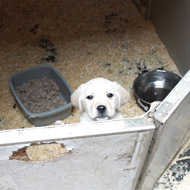
Man made at least £7,000 from selling illegally-imported dogs
A puppy seller has been jailed and banned from keeping dogs for life after pleading guilty to selling sick and dying puppies.
Martin O’Donnell received two years and eight months in jail after admitting to five counts of fraud and one count of failing to meet the needs of dogs.
His sentence comes more than a year after the RSPCA started gathering intelligence and evidence on puppy dealing in the London area.
“We were aware that there was a serious problem with the sale of poorly puppies in the capital and had been following leads for a number of months,” explained Inspector Kirsty Withnall, who led the investigation.
“Our investigations led us to puppy buyers who had purchased dogs from the address in Mottingham Road. We spoke with five people who had all bought Labrador pups from the defendant in November and December 2016 - all of which had fallen ill and one sadly died of parvovirus.”
She continued: “These dogs were being imported - we suspect illegally from southern Ireland - and being advertised online as home-bred, socialised and healthy dogs. The reality was far from this. They were weak, poorly and terrified.”
Mr O’Donnell told the court that he'd made at least £7,000 from the sale of puppies. However, RSPCA inspectors think this figure could be much higher. The court learnt that Mr O’Donnell had multiple phone numbers and email addresses “to deceive the public”.
“These people are calculating criminals who put money ahead of the health and welfare of dogs,” Inspector Withnall added. “Unfortunately, it is becoming more difficult to differentiate between legitimate, responsible breeders and unscrupulous sellers so we would urge anyone looking for a puppy to be incredibly careful, do lots of research and, if they have concerns, to walk away and report it to our cruelty line on 0300 1234 999.”



 The Veterinary Medicines Directorate (VMD) is inviting applications from veterinary students to attend a one-week extramural studies (EMS) placement in July 2026.
The Veterinary Medicines Directorate (VMD) is inviting applications from veterinary students to attend a one-week extramural studies (EMS) placement in July 2026.